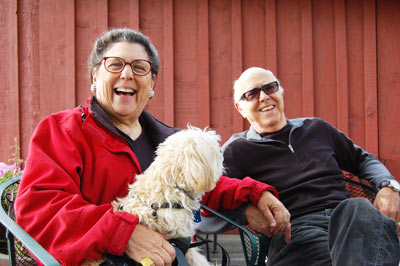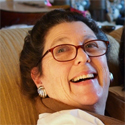Everybody Has a Story – November 2014
He doesn’t make a big noise in this town. Maybe you’ve seen him riding his recumbent bike, or playing his banjo, or sipping coffee at Pony Espresso. Maybe you go to church with him. He is just one of those friendly guys you see around town. But Fred von Tress, like most people, has a great back story.
Fred’s parents met picking peaches. Both families came fleeing the dust bowl, scratching out a living as best they could in the lush orchards of California. They had two sons: Fred’s brother in 1938, and Fred in January, 1941. It was a hard life, and Fred’s parents tried unsuccessfully to organize a union. When World War II broke out, Fred’s dad joined the Army and was sent to Japan while his mom worked as a waitress and took care of her boys. After the war, his dad went into the auto body and fender business, opening his own shop with the help of a VA loan; his mom went to work at AeroJet building electronic boards. Fred and his brother listened to the radio—Sky King, The Green Hornet, The Shadow, and Fred read books, “because there was stuff in there that the author knew about and I didn’t.”
When he graduated from high school, Fred went into the Army and was eventually sent to Germany. The year was 1959. Trained by the Army to be a court reporter, Fred spent time with educated men who respected him, and for the first time Fred realized how smart he was. After witnessing the building of the Berlin Wall and serving his time, Fred was discharged in 1962 and put on active reserve. Using the GI Bill, he began going to community college and loved it. Great people, intellectual discussion, seminars with eight students. He was happy. He began riding a bike and taking care of his body (“It’s fun. It’s exhilarating. It does something good to your brain. I can still do 40 miles.”) He married in 1963 and in 1964 transferred to San Francisco State College, graduating in 1966 with a business degree.
Fred’s first job after college was as a welfare worker in Bakersfield, California. Fred says, “It was a job of social control, of imposing regulations. We had investigators watching the welfare recipients.” He was outraged and became a community organizer during off hours. He organized a housing strike and, he says proudly, “we got conditions improved!” He applied to graduate school, and the Welfare Department wrote a letter of support. Then they found out he had organized the strike and sent a letter of retraction. But it backfired. In this post-civil rights movement era, the people at Cal State Fresno said Fred was just the person they wanted in their graduate program. So that’s where Fred went. He got his Master’s in Social Work and eventually became a Licensed Clinical Social Worker.
Fred had two daughters, Emily in 1968 and Anna in 1970, but his marriage ended in divorce a few years later. Fred was working hard but at loose ends. It was at this time, however, that he “drove by a beautiful church and went in and they offered to baptize me.” Fred became more deeply involved in the church and found his base. It was here that he met his future wife, Cheryl, began playing the banjo, and developed a deeper relationship with his children.
He worked for the State of California for eight years in an outpatient program for people newly-released from the mental hospital, eight more years working for the Veterans Administration in Yountville, and another two years a Regulator overseeing licensing of community care facilities as a Program Analyst, “confronting the bad guys, speaking up for the underdog.” He was close with his colleagues and felt proud of the good that he could do.
In 1997, he went into private practice, co-led a domestic violence intervention project for a few years, went back into private practice, and then worked two years in the prison system in California, running anger management groups.
In 2000 he and Cheryl moved to Jacksonville and he again went into private practice. He is contented. His daughters are healthy and married to good men. Each daughter has given him a grandchild. He says, “Jacksonville is paradise. You can’t have a cup of coffee by yourself here. I have no desire to live anywhere else. I go to church here and love my Pastor. I ride my bike. I play my banjo with a group of friends once a week. Cheryl and I have created a beautiful home. It’s a good life.”
The child of migrant farm workers has fulfilled the American Dream.

 KATHIE OLSEN is a former newspaper columnist, a nonprofit executive, a grandmother and a defender of the planet (and those who inhabit it). You can read about her novel TAKE ME TO MERCY and see her stories and poems at
KATHIE OLSEN is a former newspaper columnist, a nonprofit executive, a grandmother and a defender of the planet (and those who inhabit it). You can read about her novel TAKE ME TO MERCY and see her stories and poems at